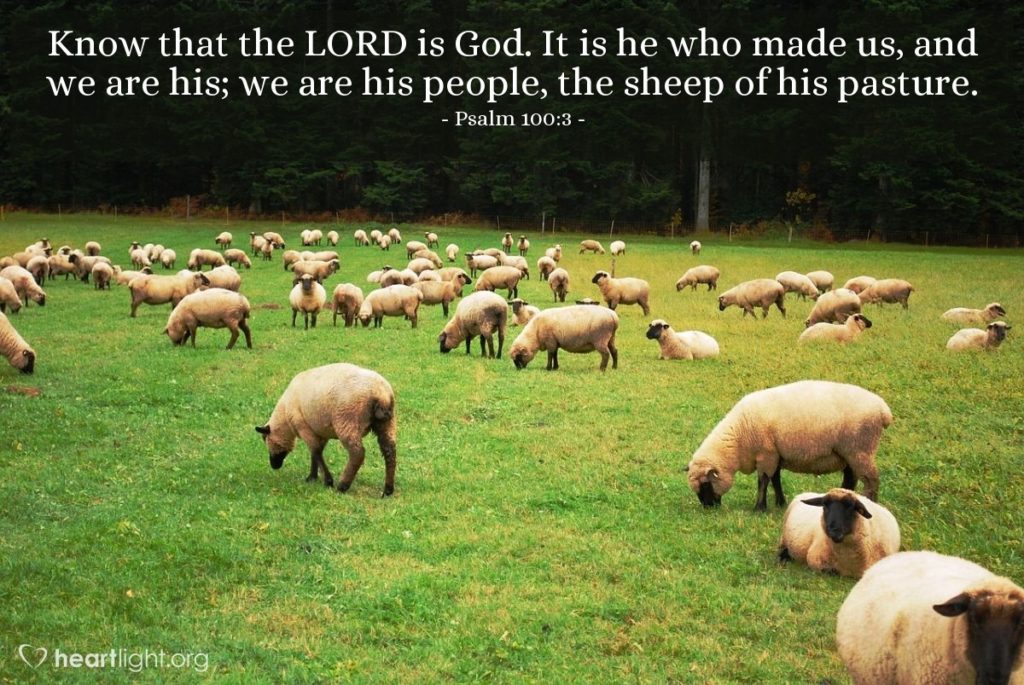Click here to return to Blog Post Intro
His Promises for Life’s Journey
Dr. Robert McQuilkin asks, “Are we reading it, ‘Goodness and mercy shall follow me every now and then’?”
“Follow” is a feeble translation of the Hebrew word rapad, which is found more than 150 times in the Old Testament. It’s usually translated “pursued,” “chased,” or “hunted.” As we encounter the word in Scripture, it typically describes being pursued by an enemy or by an animal.

Here in Psalm 23:6, David used the same Hebrew word to refer to his being pursued by goodness and mercy.
Surely
Look at the first word: surely. David didn’t say “maybe” or “possibly.” David believed in a sure God, who makes sure promises and provides a sure foundation.
The original Hebrew term David used is a very small word that can mean either “surely” or “only.” It has the basic meaning of “no doubt; this is absolutely true; this can never be doubted; it can never fail.”
When anxiety steals our peace and worry erodes our mind, it’s a sign we’re forgetting the force of this adverb in Psalm 23:6. Persuaded, convinced, know, confident, certain—surely!
Goodness and Mercy Shall Follow Me
And what follows the word surely? It’s “goodness and mercy.” As one man wrote, “Goodness to supply every want. Mercy to forgive every sin. Goodness to provide. Mercy to pardon.”
The Hebrew term David used refers to goodness in its broadest sense, covering physical, moral, practical, economic, spiritual, emotional and eternal grace toward us in all its dimensions. The Old Testament phrase “goodness and mercy” corresponds to the New Testament benedictions of “grace and mercy” frequently mentioned in the apostolic letters as a blessing.

Psalm 100 says, “We are His people and the sheep of His pasture… Be thankful to Him, and bless His name. For the Lord is good.”
Dr. Robert McQuilkin wrote, “We tend to say, ‘The Lord is my shepherd, but…I can’t pay my bills, or I don’t feel well, or even I’m worried about this problem.’ We should say, ‘I’m presently having trouble paying my bills, but the Lord is my Shepherd. I may not feel well, but the Lord is my Shepherd. His goodness follows me all the days of my life.’”
All the Days of My Life
Then, there is this phrase: “all the days of my life.” What a huge statement! Dare we envision a God who follows us? Who pursues us? Who chases us? Who tracks us down and wins us over? Who follows us with “goodness and mercy” all the days of our lives?
Here in the last verse of Psalm 23, we encounter the future tense for the first time. The writer says, “Goodness and mercy shall follow me”—and that makes verse 6 a promise, not just a statement of fact. This promise means that every day for the Christian will be filled with God’s mercy and goodness.
The prophet Jeremiah said, “His compassions never fail. They are new every morning; great is Your faithfulness” (Lamentations 3:22-23).
Surely Thy sweet and wondrous love
Shall measure all my days;
And as it never shall remove,
So neither shall my praise.
— Renowned British poet George Herbert’s classic poem “The Temple”
As Phillip Keller points out, “Of course, it is very simple to speak this way when things are going well.”
But consider the words of Jesus, “I am the good shepherd. The good shepherd lays down his life for the sheep.” As 1 John 3:16 puts it, “This is how we know what love is: Jesus Christ laid down his life for us.”
All the care, all the alert watchfulness, all the skill, all the concern, all the self-sacrifice are born of His love—the love of One who loves His sheep, loves His work, loves His role as a Shepherd.
Just as God’s goodness and mercy flow to me all the days of my life, so goodness and mercy should follow me, should be left behind me as a legacy to others wherever I may go.
Evaluate yourself with these questions:
- Do I deposit a blessing behind me, or am I bane to others?
- Is my life a pleasure to people or a pain?
The only real, practical measure of my appreciation for the goodness and mercy of God to me is the extent to which I am, in turn, prepared to show goodness and mercy to others.
Are you showing goodness and mercy to others, as you shoot for the stars?


